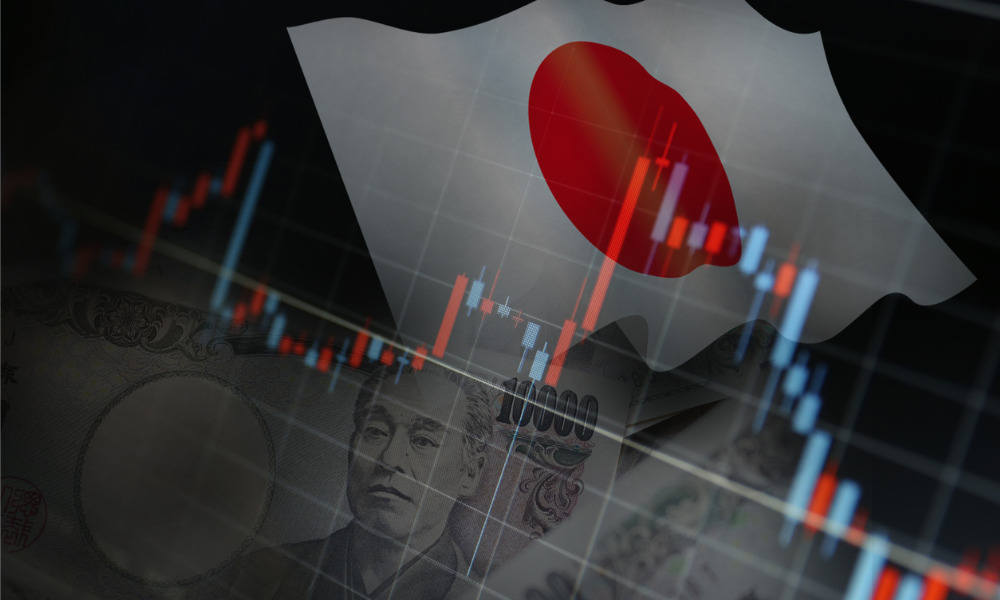

Japan’s economy unexpectedly slipped into recession after shrinking for a second quarter due to anemic domestic demand, prompting some central bank watchers to push back bets on when the nation’s negative interest rate policy will end.
Gross domestic product contracted at an annualized pace of 0.4% in the final three months of last year, following a revised 3.3% retreat in the previous quarter, the Cabinet Office reported Thursday.
The report showed both households and businesses cut spending for a third straight quarter as Japan’s economy slipped to fourth-largest in the world in dollar terms last year. Germany now has the world’s third-largest economy.
Only one of 34 surveyed economists had pointed to a contraction in the quarter, with the consensus at 1.1% growth. Overnight swaps after the result showed markets pricing in around a 63% chance of the Bank of Japan hiking by April, down from 73% a day earlier.
The weaker-than-expected result will complicate the BOJ’s case to conduct the first rate hike in Japan since 2007, a step most economists surveyed last month predicted the bank would take by April.
“This is a headwind for the BOJ,” said Takeshi Minami, economist at Norinchukin Research. “I think there was a feeling that the BOJ will end the negative rate in March or April, but a north wind is now blowing.”
The BOJ’s policy board has recently ramped up discussions surrounding an exit from the subzero rate policy and sought to assure markets that a rate hike wouldn’t signal a sharp shift in policy.
Governor Kazuo Ueda told parliament last week that financial conditions in Japan will remain accommodative for the time being even after the end of the negative interest rate, echoing one of his deputies, Shinichi Uchida.
“The surprise contraction in fourth-quarter GDP puts Japan in a technical recession and casts strong doubt over whether the Bank of Japan will follow through on signals it sent in January pointing to a quick retreat from its current policy stance.”
— Taro Kimura, economist
Thursday’s data underscored the case for keeping policy loose by reflecting Japan’s reliance on external demand as domestic demand softens amid persistent inflation.
Private consumption retreated by 0.2%, as households contending with rising costs of living tightened their budgets. Household spending fell 2.5% in December versus a year earlier, a 10th straight month of declines, as wage gains lagged inflation. Business spending was also sluggish last quarter, falling by 0.1%.
“Sticky inflation is cutting into consumers’ purchasing power, leading into weak consumption,” Minami said. “That’s mild stagflation.”
Atsushi Takeda, chief economist at Itochu Research Institute, said the slide in consumption was jarring.
“I was shocked by these results,” Takeda said. “The impact from the rise in prices was larger than expected.”
Takeda said the possibility of a BOJ rate hike in March is now virtually eliminated, though he still expects a move in April.
The yen’s weakening back to levels not seen since November threatens to spur cost-push inflationary pressure in coming months. Japan’s currency was little changed around 150.40 to the dollar after Thursday’s data.
Net exports contributed 0.2 percentage point to growth. Exports jumped in December, led by automobiles to the US and chip manufacturing gear to China. Inbound tourism, classified as service exports, also saw continued growth, with the number of visitors setting a record for the month in December.
Looking ahead, external demand may become a less dependable source of support for growth in 2024, as some of Japan’s key trading partners are expected to see growth decelerate. In its latest quarterly outlook published last month, the BOJ said the economy “is expected to be under downward pressure stemming from a slowdown in the pace of recovery in overseas economies.”
For the full year, Japan’s nominal GDP amounted to about $4.19 trillion, based on the dollar-yen rate at the end of the year. Germany’s 2023 GDP was equivalent to roughly $4.55 trillion, based on the year-end euro-dollar rate. India’s economy is set to overtake Japan’s and Germany’s in coming years, according to the International Monetary Fund.

Relationships are key to our business but advisors are often slow to engage in specific activities designed to foster them.

Whichever path you go down, act now while you're still in control.

Pro-bitcoin professionals, however, say the cryptocurrency has ushered in change.

“LPL has evolved significantly over the last decade and still wants to scale up,” says one industry executive.

Survey findings from the Nationwide Retirement Institute offers pearls of planning wisdom from 60- to 65-year-olds, as well as insights into concerns.
Streamline your outreach with Aidentified's AI-driven solutions
This season’s market volatility: Positioning for rate relief, income growth and the AI rebound
